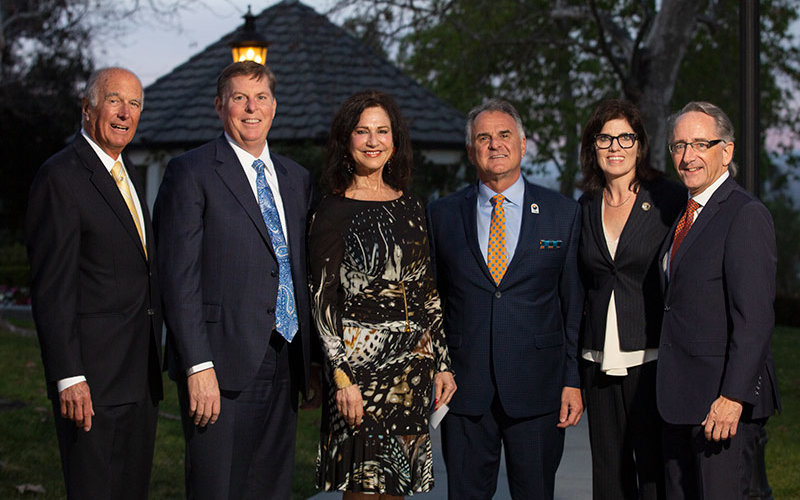
Cal State Fullerton’s Lawrence de Graaf Center for Oral and Public History revealed the latest political biographies to be added to its archive: Joe Dunn, former California state senator; Curt Pringle, former speaker of the California State Assembly; and Harriett Wieder, former Orange County supervisor (posthumously).
The three political leaders were recognized at the center’s 6th annual “Celebrating Orange County’s Political Legacy” event March 5 at the Summit House in Fullerton, where more than 250 attendees gathered to highlight accomplishments from both sides of the political aisle.
COPH’s Orange County Politics Oral History Project, which began in 2013, now has 19 oral histories in its collection.
“These are people looking back on their lives as public servants — why they got involved, what it meant to them to get involved, what issues motivated them to get involved,” said Natalie Fousekis, COPH director and professor of history. “Future generations will be much richer, and have a better understanding of our history, because of the stories we recorded this year.”
Harriett Wieder: A Woman of Firsts
Family, friends and colleagues remember Wieder as “fearless,” “not afraid to be disruptive” and “ahead of her time” on supporting women’s, water and land-use issues.
The first woman elected to the Orange County Board of Supervisors, Wieder created the Southern California Water Committee to educate and advocate for water rights; co-founded the Bolsa Chica Planning Coalition to build consensus on a new land-use plan for the 1,300-acre coastal estuary; helped fund one of the first DNA laboratories in the country after an accused rapist was acquitted due to late-arriving DNA tests; and helped establish CalOPTIMA as a county organized health system.
“To make a difference — that was my mother’s inspiration,” said Gayle Tauber, Wieder’s daughter. “She believed that everyone had the opportunity and responsibility to make a difference in macro or micro ways.”
Curt Pringle: A Passion for Politics
With an interest in politics from an early age, Pringle began attending city council meetings as a teenager and ran for Garden Grove City Council at the age of 20. “I never saw my role as having an opinion and sitting quietly on the sidelines,” he shared.
Though he came in fifth out of 13 candidates in his first city council race, Pringle went on to a lengthy political career — serving in the California State Assembly from 1988-90 and again from 1992-98. In January 1996, Pringle was elected speaker of the California State Assembly and remains the longest-serving Republican speaker of the California Assembly since 1970.
Following his time in the assembly, Pringle served as mayor of Anaheim from 2002-10, working on such projects as the 800-acre, mixed-use Platinum Triangle around Anaheim Stadium.
Joe Dunn: ‘The Man Who Cracked Enron’
Inspired at an early age by such leaders as John F. Kennedy, Bobby Kennedy, Martin Luther King Jr. and Cesar Chavez, Dunn knew “there was going to be politics in my future.”
He worked as a plaintiff’s lawyer in Orange County before serving in the California State Senate from 1998 to 2006. As chair of the Senate Investigation Committee, Dunn was dubbed “The Man Who Cracked Enron” by California Lawyer Magazine for his work on the 2001 California energy crisis.
“For the vast majority of us who have served, you look at your service as one of the greatest privileges you’ve been given in your life,” he reflected.
In addition to the energy crisis, Dunn considers co-founding UCI’s School of Law and working to get a formal apology for the state of California’s role in the illegal deportation of 1.8 million Mexicans during the 1930s among his career accomplishments.
An Archive for the Future
Established in 1968, the Lawrence de Graaf Center for Oral and Public History houses the largest regionally focused oral history archive in the state. Driven by the work of CSUF students and staff, COPH maintains more than 6,000 recorded interviews, transcripts, photographs and other materials.
Later this year, the center plans to move from its existing space on the third floor of Cal State Fullerton’s Pollak Library to an expansive space on the sixth floor. The new, state-of-the-art archive will allow the center to preserve historic oral histories, documents and photographs on its own HVAC system so they can survive in perpetuity.
“As time ticks away, as memories fade, as we lose the vibrancy and authenticity of what really happened — the important work COPH is doing is so crucial to us understanding our history and to helping us mold our futures,” said Tauber.